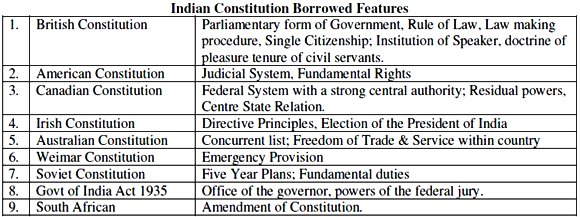Indian Polity
Constitution Day
- 26 Nov 2022
- 5 min read
For Prelims: Constitution of India, Constitution Day, Government of India Act 1935
For Mains: Drafting of the Indian Constitution, Key Features of the Constitution of India
Why in News?
Prime Minister of India launched various new initiatives under the e-court project including Virtual Justice Clock, JustIS mobile App 2.0, Digital court and S3WaaS Websites on Constitution Day, 26th November 2022.
What are the Initiatives under the E-Court Project?
- Virtual Justice Clock is an initiative to exhibit vital statistics of the justice delivery system at the Court level.
- JustIS Mobile App 2.0 is a tool available to judicial officers for effective court and case management by monitoring pendency and disposal of cases.
- Digital court is an initiative to make the court records available to the judge in digitised form to enable the transition to Paperless Courts.
- S3WaaS Websites is a framework to generate, configure, deploy and manage websites for publishing specified information and services related to district judiciary.
What is Constitution Day?
- It is celebrated on 26th November every year.
- It is also known as National Law Day.
- On this day in 1949, the Constituent Assembly of India formally adopted the Constitution of India that came into force on 26th January 1950.
- The Ministry of Social Justice and Empowerment on 19th November 2015, notified the decision of the Government of India to celebrate 26 November as 'Constitution Day’.
How was the Constitution Framed?
- In 1934, M N Roy first proposed the idea of a constituent assembly.
- Under the Cabinet Mission plan of 1946, elections were held for the formation of the constituent assembly.
- The Constitution of India is framed by the Constituent Assembly. The Constituent Assembly of India appointed a number of committees to deal with different tasks related to the framing of the constitution.
- The 8 major committees and their heads are mentioned below:
- Drafting Committee – B. R. Ambedkar
- Union Power Committee – Jawaharlal Nehru
- Union Constitution Committee – Jawaharlal Nehru
- Provincial Constitution Committee – Vallabhbhai Patel
- Advisory Committee on Fundamental Rights, Minorities and Tribal and Excluded Areas – Vallabhbhai Patel
- Rules of Procedure Committee – Rajendra Prasad
- States Committee (Committee for Negotiating with States) – Jawaharlal Nehru
- Steering Committee – Rajendra Prasad
What are the Key Facts about the Constitution of India?
- World's lengthiest Constitution.
- Federal System with Unitary Features.
- Parliamentary Form of Government.
- The framing of the Constitution took over 2 years, 11 months and 18 days.
- The original copies of the Indian Constitution weren’t typed or printed. They have been handwritten and are now kept in a helium-filled case within the library of the Parliament.
- Prem Bihari Narain Raizada had written the unique copies of the Constitution of India.
- Originally, the Constitution of India was written in English and Hindi.
- The basic structure of the Indian Constitution stands on the Government of India Act, 1935.
- The Constitution of India has also borrowed some of its features from a number of countries.
UPSC Civil Services Examination, Previous Year Questions (PYQ)
Prelims
Q. What was the exact constitutional status of India on 26th January, 1950? (2021)
(a) A Democratic Republic
(b) A Sovereign Democratic Republic
(c) A Sovereign Secular Democratic Republic
(d) A Sovereign Socialist Secular Democratic Republic
Ans: (b)
Exp:
- The Constituent Assembly on 26th November, 1949, adopted, enacted and gave citizens their own Constitution.
- The Constitutional status of India on 26th January,1950 was a Sovereign Democratic Republic as the words- Socialist and Secular were added to the Preamble by the 42nd Constitutional Amendment Act, 1976.
- Presently, the Preamble to the Indian Constitution defines India to be a Sovereign, Socialist, Secular and Democratic Republic.
- Therefore, option B is the correct answer.
Mains
Q. It would have been difficult for the Constituent Assembly to complete its historic task of drafting the Constitution for Independent India in just three years but for the experience gained with the Government of India Act, 1935. Discuss. (2015)





